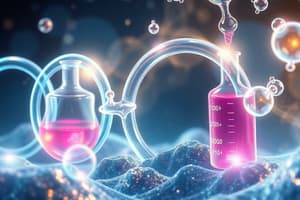Podcast
Questions and Answers
What are hydrocarbons composed of?
What are hydrocarbons composed of?
- Only hydrogen atoms
- Oxygen and nitrogen atoms
- Hydrogen and carbon atoms (correct)
- Only carbon atoms
What type of bonds do saturated hydrocarbons have?
What type of bonds do saturated hydrocarbons have?
- Triple bonds
- Quadruple bonds
- Double bonds
- Single bonds (correct)
What happens to the boiling point and melting point of hydrocarbons as the molecular weight increases?
What happens to the boiling point and melting point of hydrocarbons as the molecular weight increases?
- They increase (correct)
- They remain the same
- They decrease
- They fluctuate
What is a characteristic of hydrocarbons in terms of solubility in water?
What is a characteristic of hydrocarbons in terms of solubility in water?
What is a common reaction that hydrocarbons undergo with oxygen?
What is a common reaction that hydrocarbons undergo with oxygen?
What is an important biological application of hydrocarbons?
What is an important biological application of hydrocarbons?
Study Notes
Definition and Classification
- Hydrocarbons are organic compounds consisting of only hydrogen and carbon atoms.
- Classified into two main categories:
- Saturated hydrocarbons (alkanes): single bonds between carbon atoms
- Unsaturated hydrocarbons (alkenes and alkynes): one or more multiple bonds between carbon atoms
Types of Hydrocarbons
- Alkanes (saturated):
- Methane (CH4)
- Ethane (C2H6)
- Propane (C3H8)
- Butane (C4H10)
- Pentane (C5H12)
- Alkenes (unsaturated):
- Ethene (C2H4)
- Propene (C3H6)
- Butene (C4H8)
- Alkynes (unsaturated):
- Ethyne (C2H2)
- Propyne (C3H4)
Physical Properties
- Boiling point and melting point increase with increasing molecular weight
- Density increases with increasing molecular weight
- Solubility in water decreases with increasing molecular weight
- Hydrocarbons are generally non-polar and insoluble in water
Chemical Properties
- Combustion: hydrocarbons react with oxygen to produce carbon dioxide and water
- Halogenation: hydrocarbons react with halogens to form halogenated compounds
- Isomerization: hydrocarbons can undergo isomerization reactions to form structural isomers
- Cracking: hydrocarbons can undergo cracking reactions to form smaller molecules
Importance and Uses
- Energy sources: fossil fuels (petroleum, natural gas, coal) are primarily composed of hydrocarbons
- Industrial applications: used as solvents, lubricants, and fuels
- Biological importance: hydrocarbons are found in biological systems, such as fatty acids and cholesterol
Definition and Classification
- Hydrocarbons are organic compounds composed of only hydrogen and carbon atoms.
- Classified into two main categories: saturated hydrocarbons (alkanes) and unsaturated hydrocarbons (alkenes and alkynes).
Types of Hydrocarbons
- Alkanes (saturated): methane (CH4), ethane (C2H6), propane (C3H8), butane (C4H10), and pentane (C5H12).
- Alkenes (unsaturated): ethene (C2H4), propene (C3H6), and butene (C4H8).
- Alkynes (unsaturated): ethyne (C2H2) and propyne (C3H4).
Physical Properties
- Boiling point and melting point increase with increasing molecular weight.
- Density increases with increasing molecular weight.
- Solubility in water decreases with increasing molecular weight.
- Hydrocarbons are generally non-polar and insoluble in water.
Chemical Properties
- Combustion: hydrocarbons react with oxygen to produce carbon dioxide and water.
- Halogenation: hydrocarbons react with halogens to form halogenated compounds.
- Isomerization: hydrocarbons can undergo isomerization reactions to form structural isomers.
- Cracking: hydrocarbons can undergo cracking reactions to form smaller molecules.
Importance and Uses
- Energy sources: fossil fuels (petroleum, natural gas, coal) are primarily composed of hydrocarbons.
- Industrial applications: used as solvents, lubricants, and fuels.
- Biological importance: hydrocarbons are found in biological systems, such as fatty acids and cholesterol.
Studying That Suits You
Use AI to generate personalized quizzes and flashcards to suit your learning preferences.
Description
Learn about the definition and classification of hydrocarbons, including saturated and unsaturated hydrocarbons, alkanes, and alkenes.




